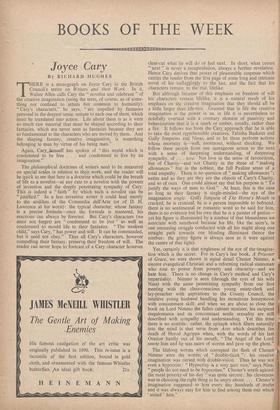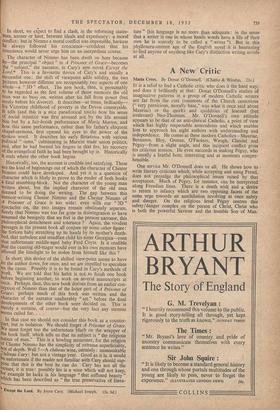BOOKS OF THE WEEK
Joyce Cary
By RICHARD HUGHES THERE is a monograph on Joyce Cary in the British Council's series on Writers and their Work. In it, Walter Allen calls Cary the " novelist and celebrant " of the creative imagination (using the term, of course, as of some- thing not confined to artists but common to humanity). " Cary's characters," he says, " are impelled by fantasies personal in the deepest sense, unique to each one of them, which must be translated into action. Life about them is as it were so much raw material that must be shaped according to their fantasies, which are never seen as fantasies because they are so fundamental to the characters who are moved by them. And the shaping fantasy, creative imagination, is something belonging to man by virtue of his being man."
Again, Cary_leimself has spoken of " this world which is condemned to be free . . . and condemned to live by its imagination."
The philosophical doctrines of writers need to be measured on special scales in relation to their work, and the reader will be quick to see that here is a doctrine which could be the breath of life to a novelist—at any rate to a novelist with the powers of invention and the deeply penetrating sympathy of Cary. This is indeed a " faith " by' which such a novelist can be " justified?' In a less inventive writer it could lead merely to the aridities of the Commedia dell'Arte (or of D. H. Lawrence at his worst): the typical character, whose fantasy is a precise formula—once the formula is mastered, his reactions can always be forecast. But Cary's characters (we must not forget) are " condemned to be free" as well as condemned to mould life to their fantasies. " The weakest child," says Cary, " has power and will. It can be commanded, but it need not obey." Thus all Cary's characters, however compelling their fantasy, preserve their freedom of will. The reader can never hope to forecast of a Cary character however clear-cut what he will do or feel next. In short, what comes " next " is never a recapitulation, always a further revelation. Hence Cary derives that power of pleasurable suspense which carries the reader from the first page of some long and intricate novel of his unflaggingly to the last, and the fact that his characters remain, to the end, lifelike.
But although because of this emphasis on freedom of will his characters remain lifelike, it is a natural result of his emphasis on the creative imagination that they should all be a little larger than life-size. Granted that in life the creative imagination is the power in us, in life it is nevertheless so dolefully overlaid with a contrary element of passivity and behaviourism that it is a spark or ember, usually, rather than a fire. It follows too from the Cary approach that he is able to take the most reprehensible creatures, Tabitha Basketts and Gully Jimpsons and Ninas, and to let them perform actions whose enormity is—well, enormous, without shocking. We follow these people from one outrageous action to the next with a sense of deepening understanding, of deepening sympathy, of . . . love. Not love in the sense of favouritism, but of Charity—and not Charity in the sense of " making allowances " but in the noblest, the full Pauline sense of a total empathy. There is no question of " making allowances "; entire and as they are they are the objects of Cary's Charity, and so of ours. One could almost say that his purpose is " To justify the ways of man to God." At least, this is the case so long as their fantasy is single-minded—the eye of the imagination single. Gully Jimpson of The Horse's Mouth is cracked, he is criminal, he is a person impossible to befriend, there is no sentimental or romantic word to be said for him, there is no evidence but his own that he is a painter of genius— yet his figure is illuminated by a nimbus of that blessedness we associate with sainthood because his life, like the saint's, is one unceasing struggle conducted with all his might along one straight path towards one blinding illuminant (hence the nimbus: the grimy figure is always seen as it were against the centre of that light).
Yes, certainly it is that singleness of the eye of the-imagina- tion which is the secret. For in Cary's last book, A Prisoner of Grace, we were shown in equal detail Chester Nimmo, a sincere evangelical Christian and a reforming radical statesman who rose to power from poverty and obscurity—and we hate him. There is no change in Cary's method and Cary's impartiality. Niinmo is seen (through the eyes of his wife Nina) with the same penetrating sympathy, from our first meeting with the class-conscious young estate-clerk and lay-preacher with aspirations to the County Council, the intuitive young husband handling his monstrous honeymoon with consummate skill; and when we are about to close the' book on Lord Nimmo the fallen cabinet minister, his incipient megalomania and its concomitant senile sexuality are still described with sympathy and understanding. Yet this time there is no nimbts : rather, the, epitaph which filters naturally into the mind is that verse from Acts which describes the death of Herod Agrippa when, with the words of his last Oration'. hardly out of his mouth, " The Angel of the Lord smote him and he was eaten of worms and gave up the ghost."
The lifelong worms which corrupted the flesh of Chester Nimmo were the worms of " double-think ": his creative imagination was cursed with double-vision. Thus he was not even a hypocrite: "Hypocrisy is a very tare vice," says Nina, " people do not need to be hypocrites." Chester's wrath against the rural poverty of his day " was quite sincere : his cleverness was in choosing the right thing to be angry about. ... Chester's imagination suggested to him every day hundreds of _truths and it was always easy for him to find among them one which suited ' him." In short, we expect to find a clash, in the reforming states- man, sooner or later, between ideals and expediency : a moral conflict: but in Nimmo a moral conflict was impossible, because he always followed his conscience—confident that his conscience would never urge him on an inexpedient course.
The character of Nimmo has been dwelt on here because he—the principal " object " in A Prisoner of Grace—becomes the " subject,' the narrator, in Cary's new novel Except the Lord.* This is a favourite device of Cary's and usually a successful one: the shift of viewpoint adds solidity, the two pictures however different are recognisably two aspects of one Whole—a " 3D " effect. The new book, then, is presumably to be regarded as the first volume of those memoirs the old man was so busy on, written after his fall from power (but surely before his divorce). It describes—at times, brilliantly— his Victorian childhood of poverty in the Devon countryside. It tells (and this is a nice paradoxical touch) how his sense of social injustice was first aroused not by. the life around him but by a fair-booth performance of Maria Marten, and bow this same performance, rather than his father's eloquent chapel-sermons, first opened his eyes to the power of the spoken word. It describes his early flirtations with various political " -isms," culminating in Marxist trade union politics, and, after he had burned his fingers in that fire, his recovery of the evangelical faith he had been brought up in. Historically it ends where the other book begins.
Historically, too, the account is credible and satisfying. These are the kind of beginnings out of which the character of Chester Nimmo could have developed. And yet it is a question of character which is likely to prove to the reader of both books a fatal stumbling-block. Not the character of the young man Written about, but the implied character of the old man deemed to be doing the writing. The gap between this memoir-writing Chester Nimmo and the Chester Nimmo of A Prisoner of Grace is too wide: even with our " 3D " spectacles on, the two images remain obstinately separate. Surely that Nimmo was too far gone in disintegration to have assumed the benignity that we feel in the present narrator, this philosophical detachment and tolerance ? Again, the vividest passages in the present book all conjure up some other figure: the forlorn baby stretching up its hands by its mother's death- bed, that turbulent and steadfast child his sister Georgina—even that unfortunate middle-aged baby Fred Coyte. Is it credible that the cunning old-stager would ever in his own memoirs have allowed the limelight to be stolen from himself like this ?
In short, this device of the shifted view-point seems to have let the author down, for once, and we are impelled to speculate on the cause. Possibly it is to be found in Cary's methods of work. We are told that his habit is not to finish one book before beginning another, to work on several manuscripts at once. Perhaps, then, this new book derives from an earlier con- ception of Nimmo than that of the latter part of A Prisoner of Grace: perhaps much of this book was written and the Character of the narrator unalterably " set " before the final developments of the other book were decided on. This is Merely a surmise, of course—but the very fact any surmise seems called for. . . .
In that case we should not consider this book as a counter- Part, but in isolation. We should forget A Prisoner of Grace. We must forget too the unfortunate blurb on the wrapper of the book itself, which tells us that its subject is " the religious nature of man." This is a howling misnomer, for the religion of Chester Nimmo has the simplicity of extreme superficiality, not of depth. Well ?—A chateau wine, certainly : unmistakable t:luiteau Cary: but not a vintage year. Good as it is, it would be unfortunate if the reader not familiar with Cary should sup- Pose that this is the best he can do. Cary has not all the virtues, it is true : possibly his is a wine which will not keep, for example he lacks in his language " that suffused beauty " Which has been described as " the true preservative of litera- ' Except the Lord. By Joyce Cary. (Michael Joseph. 12s. 6d.) ture " (his language is no more than adequate : in the sense that a writer is one in whose hands words have a life of their own he is scarcely to be called a " writer "). But in this phylloxera-smitten age of the English novel it is heartening to find anyone of anything like Cary's distinction writing novels at all.











































 Previous page
Previous page